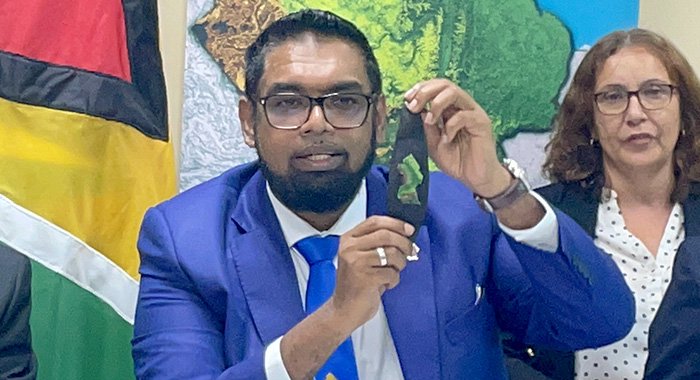By Kenton X. Chance
KINGSTOWN, St. Vincent (CMC) – Guyana’s President Irfaan Ali Thursday said that his administration is “unwavering” in its position regarding the ownership of the Essequibo region that is being claimed by Venezuela as the leaders of the two countries entered their “third phase” of discussions here.
Ali, speaking at a news conference, told reporters that Georgetown would not support any “partnership, any trade, any collaboration, any cooperation, the issuing of any licences and the granting of concessions within our territorial space and within our sovereign space”.
“I made it clear that the controversy must be resolved at the ICJ (International Court of Justice) and we are unwavering and resolute in ensuring that Guyana’s case is presented, defended and at the ICJ … which, of course, is binding on all the parties,” said Ali, who showed reporters a wrist band he is wearing with the map of Guyana on it.
“This is Guyana,“ he said.
The discussions here are being facilitated by the Community of States of Latin America and the Caribbean (CELAC) and the Caribbean Community (CARICOM).
The second phase of the deliberations between President Ali and Venezuela’s President Nicolas Maduro, was attended by CARICOM leaders, CELAC, Brazil and UN observers.
Both Guyana and Venezuela have laid claim to the Essequibo region, which makes up about two-thirds of Guyana and is home to 125,000 of the country’s 800,000 citizens.
Ali, who had earlier briefed regional leaders ahead of the first round of talks with Maduro, told reporters that he made it clear “that the process leading up to the ICJ is part of the Geneva Agreement and that the Geneva Agreement provides for a UN secretary general to determine where the controversy must be finally determined.
“And it is a UN Secretary General, acting within the confines of the Geneva Agreement, who determined that that is the ICJ,” Ali said, adding that Guyana has agreed with all the regional partners that the priority is peace.
“Every threat of force or the use of force must be denounced and that every party must take responsibility. We made it very clear that Guyana is not the aggressor. Guyana is not seeking war, but Guyana reserves the right to work with all our partners to ensure the defence of our country.
“All our partnership is based on the defence of our territorial integrity and sovereignty,” President Ali said, adding that as “we move forward in the next phase of the meeting and in keeping with the invitation which sought to enable a process of dialogue on consequential issues, not on the issue before the ICJ , that the shape and form of that dialogue … is the next phase of these meetings”.
Ali said that both parties have committed to ensuring that the region remains a zone of peace and within the “sovereign space of Guyana we will continue to do everything that promotes the development and to ensure the defence and protection of what is ours in accordance with international law”.
Ali told reporters that the earlier phases of the discussions “were clearly outlining our positions, and now we are moving to the next phase and I am not going to delve into that phase…
“Up to what I have updated you all, that’s where we are,” Ali said, adding “the dialogue is ongoing”.






